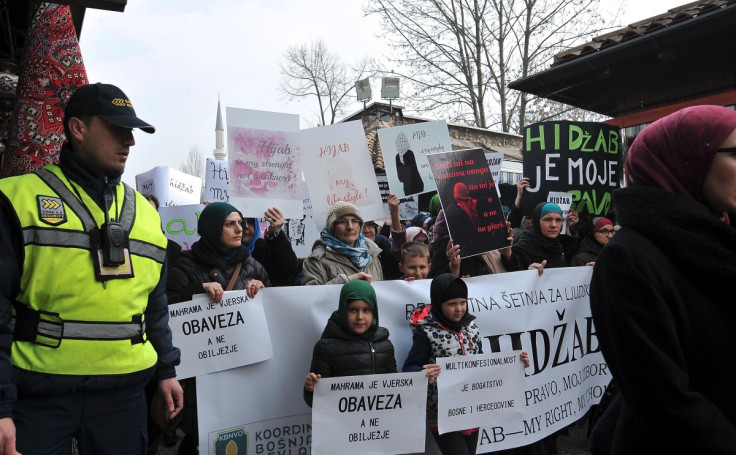Around 2,000 women protest hijab ban in Bosnia

Around 2,000 women marched through Bosnia's capital Sarajevo on 7 February protesting a ban on the hijab for all lawyers, prosecutors and others professionals working in the country's judicial institutions. The protest comes after the judicial council decided to ban "religious signs", which explicitly mentions the hijab.
The decision of the judicial council, which supervises the functioning of the judiciary, was criticised by Muslim politicians and religious leaders. At the protest rally, women were seen carrying banners such as "Hijab is my Right" and "Hijab is my Life".
"We gathered to protest against prejudices, discrimination and marginalisation," Samira Zunic Velagic, one of the protest organisers, was quoted as saying by Agence France-Press. "The ban of wearing hijab in judicial institutions is a serious attack against Muslim honour, personality and identity, a violation... aimed at depriving them of their right to work," she said.
"We came here to say that we are not the victims of this scarf. We came to defend our rights. It is our crown, our liberty, our honour," Elisa Hamovac, 33, said.
The decision to ban the hijab was announced in October 2015, while it only came into effect two weeks ago. "No one is saying that by wearing a religious symbol, the person is biased. But the fact is that the third party who is in court, who is being tried, can be prejudiced and think that there is no neutrality," Milan Tegeltija, the president of the High Judicial and Prosecutorial Council, was quoted as saying by The Siasat Daily.
Communist authorities had banned the hijab when Bosnia was still a part of former Yugoslavia, before it gained independence in 1992.
Under the ruling, lawyers, court officials and others employed in the legal system will no longer be permitted to wear the hijab to work, while the permission of witnesses and other third parties taking part in hearings to wear the headscarf will be decided on a case-by-case basis.
Since the law was passed a series of petitions have been posted online calling for it to be rescinded, and on 1 February, World Hijab Day, Bosnian activists posted pictures of themselves wearing the headscarf and holding the sign #unbiased.
Around 40% of Bosnia's 3.8 million people are Muslim, while the rest are mostly Orthodox and Catholic Christians.
© Copyright IBTimes 2025. All rights reserved.





















